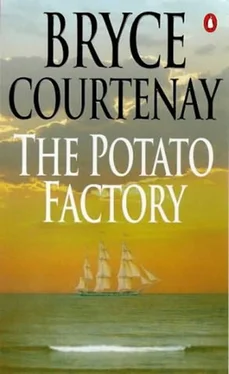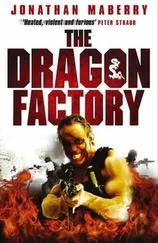These remedies, when compared to the treatment of convict men, were undoubtedly exceedingly mild, especially as it was generally held that the female convict was far more difficult to reform than the male, her general characteristics being immodesty, drunkenness and foul language, though, of course, this was a male assertion and not to be entirely trusted.
While official leniency may have existed for the female of the species, no such thing was true of the unofficial behaviour of men towards women. Van Diemen's Land was a brutal society and violence towards women was so common as to place a female convict, who was thought to be of little worth, in constant jeopardy. Rapes were frequent and brutal bashings of females were as commonplace as a Saturday night tavern fight. Settlers, returning home drunk, would beat their female servants, sometimes crippling or even killing them. The body was usually dumped on the outskirts of Hobart Town and the murder would then simply be explained by reporting the prisoner as missing.
It is doubtful that the less stringent laws Arthur imposed on females were very successful in reforming them. But there was danger enough abroad for any convict woman, and fear of the law was the least of her concerns, nor observance of it likely to make her life any easier. Only the threat of being sent to the interior seemed to have any real effect. No greater fear existed in these city-bred women than that they should find themselves in the wilderness of the interior, where the cruelty of the men who lived as woodcutters in the forests was the subject of many fearful and gruesome tales told in the taverns and the disorderly houses of Hobart Town.
In short then, although Mary's confinement to the Female Factory might have seemed the harsher sentence, assignment to a settler was not the easy ride so fondly imagined by Mary's shipmates.
The moment Mary had heard of the existence of the orphans' school she had determined to gain a post within it as a teacher. The orphans' school housed the children who, shortly after birth, had been separated from their mothers. They were, for the most part, the children of assigned convicts. The women were routinely returned to the Female Factory by their masters, always with the story that the prisoner had been absent without a pass and had become pregnant while whoring. Hobart was full of orphan brats who bore a remarkable resemblance to many a settler's family.
The child would be born at the Factory, which also acted as a maternity hospital, and taken from its mother the moment it was weaned. Arthur considered the female convicts the very last persons to whom children ought to be entrusted. The mother would then be detained in the Female Factory to be punished for her licentious and drunken ways, and after serving her additional sentence either returned to her original master or assigned to another.
The children who had come to the island with their convict mothers and who were not convicts themselves were simply allowed to stay in the Factory with their mothers, as few settlers would entertain the prospect of another mouth to feed. They became wild creatures who wandered about the town and learned to pick pockets, bring in contraband, mostly tobacco and grog, and soon became rapscallions and petty thieves of the worst possible kind. Many of them were hardened criminals before they had reached the age of ten.
Mary would capture the hearts of these prison children with her stories and teach those who would submit to learning to read and write. She would also use them in quite another way, which was to earn her great power and respect among the other female inmates.
Mary was put to work in the prison bakery. This was not brought about by her intelligence or any skill she possessed, but because of her hands. They were thought to be too mutilated to be useful at any of the other tasks, while kneading dough was considered within her limited capacity.
It was a decision which, together with the requirement that Mary work two afternoons a week in the prison allotment, would give the direction to her future life. The allotment, an acre on the slopes of Mount Wellington, was used to grow potatoes, cabbages and some Indian corn, two of these, most fortuitously, being vegetables with a use beyond the platter, though a use not in the least contemplated by the prison officials.
Ikey had eight hundred and thirteen pounds on him. Some of this was the remainder of the money paid to him in Birmingham by Maggie the Colour and Silas Browne, and some furnished by Hannah as a ploy to convince him of her sincerity in aiding his intended escape. It was sufficient to pay his fare to America from Denmark, as well as allowing him to stock up on merchandise likely to be in short supply in the New World.
Ikey, always a dreamer and schemer, saw America as a land of rich pickings for a man of his character and talent. It was his intention to land with a portmanteau stuffed with merchandise to confound the locals.
Alas, this was not to be, the prices for these articles in Denmark being too high at the shopfront and, besides, it was against Ikey's principles to purchase goods which afforded only a small margin of profit. It had not occurred to him that the Danish Jews might not speak Yiddish or contain a Jewish criminal class who would furnish the merchandise he required direct from the fob pockets of the unsuspecting citizenry, and therefore at prices a lot more competitive than those obtainable in wholesale jewellery emporiums.
So Ikey took the first ship he could find bound for New York. Though his hands were empty his head was full of plans for a life lived on the straight and narrow path as a merchant jeweller.
The crossing was rough and utterly miserable. In late February the Atlantic swells were large and frequent gales whipped the tops of the steel-coloured waves into a fury of howling white spray. The small three-masted packet was tossed like a cork seemingly all the way to the mouth of the Hudson River.
On a cold March morning, with dirty islands of late ice still floating on the river, the ship anchored at the immigration wharf at Castle Gardens. By early afternoon Ikey had paid his entry fee, been subjected to a smallpox vaccination and was allowed to step onto the streets of New York as free as an English lark.
It is a part of the human imagination to carry in our minds pictures of places we have heard or read about, pictures which have no substance other than the bricks and mortar of pure speculation. Ikey had expected New York to be a city not unlike London, though perhaps more primitive, for New York too lay on a great river and spoke the English tongue with a strange half-Irish intonation.
As an English Jew Ikey had assumed that he would fit in snugly enough. After all, the Jews of his world were street traders and merchants and of a naturally talkative and friendly disposition with the inclination to congregate together, marry among themselves, and on those several pious occasions such as Passover, Rosh Hashanah and Yom Kippur to share their faith. They would also attend synagogue on the Sabbath as brothers according to the ancient laws of Abraham, the prophets and the rabbinical creed.
Being a Jew, while being a matter of religion and orthodoxy, was also one of temperament. A Jew does not expect any but his own kind to understand him. Being Jewish is not something you wear outwardly like a badge, rather it is something you feel inwardly. It is as if your heart beats to a different cadence. This is as true of the Jew who is a villain as it is of one who is a rabbi. The smell of a chicken soup fart with noodles is absolutely one hundred per cent unmistakably Jewish. If you should be making chicken soup, delicious chicken soup, and you wish to make it Jewish, maybe you could try making these noodles.
Читать дальше












